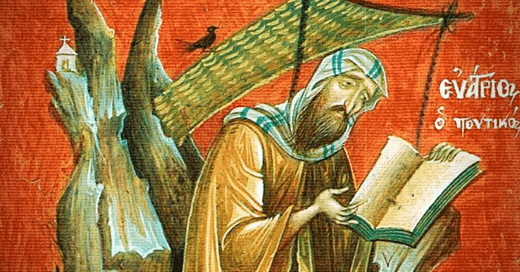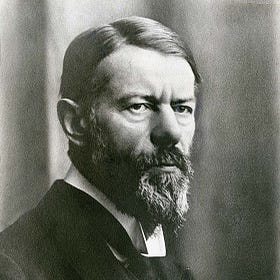AND when this has taken possession of some unhappy soul, it produces dislike of the place, disgust with the cell, and disdain and contempt of the brethren who dwell with him or at a little distance, as if they were careless or unspiritual.
It also makes the man lazy and sluggish about all manner of work which has to be done within the enclosure of his dormitory.
It does not suffer him to stay in his cell, or to take any pains about reading, and he often groans because he can do no good while he stays there …
a kind of unreasonable confusion of mind takes possession of him like some foul darkness, and makes him idle and useless for every spiritual work, so that he imagines that no cure for so terrible an attack can be found in anything except visiting some one of the brethren, or in the solace of sleep alone.
John Cassian, Institutes
In 415 St. John Cassian arrived in Marsilla (modern-day Marseilles) to establish a monastery and nunnery. Cassian had spent over two decades in the Egyptian desert community of Scetis, a loose confederation of hermits who spent most of their time alone in rough-hewn huts or shallow caves.
At Scetis, Cassian’s day began before dawn when a few disciples met with an older hermit to recite psalms. After this they returned to their rough-hewn huts or shallow caves to spend the day in recitation, prayer and work -- typically weaving reeds and palm fronds into baskets, mats and ropes which could be sold in the nearby villages.
At the ninth hour (3 pm or so) the hermits would gather again for a humble meal of bread with beans and lentils. After eating they might visit briefly, then return to their cells to pray and work until sleep overwhelmed them. On Saturdays, Sundays and holy days they gathered together in the church they had built for communal worship.
Cassian was driven from his beloved desert due to Alexandrian theological and political conflicts. He hoped here to rebuild the cenobic communities he had enjoyed in happier times before the world had intervened. And when he arrived, he discovered that many in Marsilla longed for their own desert.
In 415 Gaul was still nominally a Roman province, but real power largely lay in the hands of local strongmen. Many of the Gallo-Romans residing in Marsilla were driven there after the Visigoths came pouring over the Empire’s northern border. These refugees knew very well that their treasures of this earth were transitory and hoped to gain a share in the kingdom of Heaven.
But although there was considerable interest in monastic life, there was little in the way of monastic experience. Aspiring Gallic monks and nuns had heard stories of the incredible austerities practiced in Egypt and the miracles wrought daily by Egyptian holy men. But they had no realistic picture of a contemplative life, nor any idea of the difficulties faced by these ascetic hermits.
Cassian provided them with personal guidance as a spiritual leader, as was the Egyptian custom. The Desert Fathers looked with suspicion on written texts, fearing that in the hands of those not spiritually prepared they would do more harm than good. But at the request of several high-ranking Church officials, Cassian agreed to write down some of his experiences. To that end, he wrote two influential tomes, the Institutes and Conferences.
Among those works was a list of the "eight deadly sins" which he had received from the Egyptian Desert Father Evagrius Ponticus. These would later become the "Seven Deadly Sins" after "Sadness" and "Acedia" were lumped together as "Sloth." Cassian explained the difference:
There are two kinds of Sadness.
The first is begotten once anger has ceased, or from some hurt that has been suffered or from a desire that has been thwarted and brought to naught.
The other comes from unreasonable mental anguish or from despair.
There are two kinds of Acedia.
One makes those who are seething with emotion fall asleep.
The other encourages a person to abandon his home and to flee.
Acedia manifests as an inability to concentrate on the tasks at hand alongside a deep dissatisfaction and ennui. Sufferers find no joy even in work which they normally love: the whole process seems unbearably tedious. Some run away from their cells and return to the world. Others continue to go through the motions without the fervor that once sustained them.
Acedia might begin early in the day but normally became most troubling at noon, the time when rest seemed far away and the prayers felt like they had gone on forever. As a result, many monks called it "the noonday demon."
The Undeserving Poor
Like the Calvinists who would arise over a millennium later, the Desert Fathers recognized that diligent attention and work can alleviate Acedia. St. John Cassian told the story of Abbot Paul, who overcame Acedia by weaving mats and baskets while he prayed. Because his cell was too remote to carry his wares to market, Abbot Paul burned them at the end of each year and started anew. By making reed-weaving part of his prayer, he was able to resist his discontentment.
While it was first diagnosed in the 4th century, Acedia remains a pressing problem today. And despite the fact that we have better ways of passing our spare time than basketmaking, we have been less successful at driving the Noonday Demon away.
It is a very curious phenomenon, this progress of accidie from the position of being a deadly sin, deserving of damnation, to the position first of a disease and finally of an essentially lyrical emotion, fruitful in the inspiration of much of the most characteristic modern literature. The sense of universal futility, the feelings of boredom and despair, with the complementary desire to be “anywhere, anywhere out of the world,” or at least out of the place in which one happens at the moment to be, have been the inspiration of poetry and the novel for a century and more…
What is the significance of this fact? For clearly the progress of accidie is a spiritual event of considerable importance. How is it to be explained?
Aldous Huxley, On the Margin (1923)
Nuns weeding convent gardens, monks brewing beer, and hermits reciting their prayers in the wilderness all had a sense of purpose. Their lives revolved around a Holy Order and their sacrifices were for the Greatest Good. When God died, so did Holy Order and Greater Good. We were no longer created for a purpose, but were rather tasked with creating ourselves.
But to create yourself, you must first recognize the boundaries that distinguish you from others. The tribal boundaries that once delineated friends and foes are now unfashionable. Identifying by one’s ancestry is particularly problematic. A true individual stands out from the bland crowd in some way.
Our modern world places a high premium on individuality and frowns on conformity. The alienated outcast struggling against a narrow-minded and hostile society has become the hero of our age. James Dean, Johnny Rotten, Marilyn Manson, and many others helped generations of imitators declare their independence from the herd. Monks spent long hours praying in the Desert for a fleeting glimpse of the Other. Today many seek to build an identity by becoming the Other.
But the more transgression is accepted, the harder it is to be transgressive. That which is tolerated is also overlooked. The Current Thing is soon last season’s fashion, and the beliefs that earned you attention last year are now mainstream. And, so as Lars Svendsen notes in his excellent 2008 book A Philosophy of Boredom:
Deviation has become conformist. Everyone today has to be “something special,” without standing out in any way at all. Deviation is boring. When individualism is conformist, conformism also becomes individualistic.
Boredom is an itch you can’t ignore. You don’t like where you are and you don’t like what you are doing. But you have no available choice that is more appealing to you. You have to see that DMV representative or take down the notes for Professor Monotone’s class. Situational boredom is an unavoidable fact of life. But a growing number of people boredom is not situational but perpetual.
The Gluttony of Sensation
Many in the modern world work at jobs they dislike so they can come home and lose themselves in video games, pornography, or the latest streaming series. Each day they find their life a little less exciting. But they see neither a way out of their cage nor a reason why they should even bother to escape. And as they continue going through the motions their Acedia becomes a deadlier form of Sloth, the one that some translators have rendered as “sorrow” or “Sadness” but which is better named Despair.







This is very on point for me. I just left a remote work job because sitting at home every day just got to me.
I still feel the pull of acedia, and is probably the hardest sin to overcome. Ennui seems inevitable, as I look out in the world and see a shallow, empty, culturally dead society. The people I meet seem like robots. No labor seems worthwhile.
I now know HOW I should go about doing things but don't know WHAT to do, and this is infinitely frustrating.
This is super interesting, this acedia. I see where you are going. I'm not sure I agree that individualism is popular; where I live, people conform to an established position. I am outlier and remind myself that Napoleon said it takes more courage to suffer than to die. Also, the acedia circumstance can be address with various drugs, to my way of thinking; such solutions can save the day and save the life. And they can restore work ethic and congeniality. Thanks so much, love this esoteric stuff.